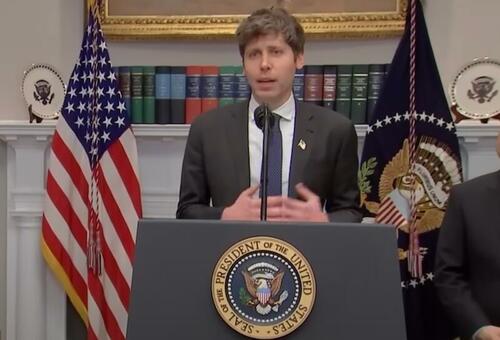Authored by Vince Quill via CoinTelegraph.com,
US President Donald Trump’s administration has recently partnered with OpenAI to deploy the enterprise-level version of the ChatGPT platform across all federal agencies as part of an initiative to modernize operations.
According to an announcement from the US General Services Administration (GSA), all US government agencies will have access to the AI platform for a nominal fee of $1 per agency to facilitate seamless integration of AI into workflow operations.
The GSA, the US government’s procurement office, highlighted that this partnership directly supports the White House’s AI Action Plan, which aims to establish US leadership in AI development.

OpenAI CEO Sam Altman emphasized the importance of US investment in AI during a press conference with US President Donald Trump earlier this year. Source: CBS News
Despite the push for modernization, concerns have been raised regarding the potential negative implications of the ongoing AI race between nation-states on various aspects such as privacy, data protection policies, censorship, cybersecurity, civil liberties, and governance.
The risks associated with centralized AI in government
In a recent development, the US Space Force temporarily halted the use of generative AI tools, including ChatGPT, citing cybersecurity concerns over sensitive national security data.
Lisa Costa, the Space Force’s deputy chief of space operations for technology and innovation, emphasized the need for enhanced data protection standards before widespread adoption of large-language models (LLMs) and AI service providers within the military.
Public apprehensions surrounding the automation of government processes with AI have also grown alongside the rapid advancements in the AI industry.
In a controversial move, Sweden Prime Minister Ulf Kristersson admitted to consulting AI for policy decisions, sparking a debate on the ethical use of AI in governance.
It is important to note that large-language models and AI chatbots gather extensive user data from various sources to enhance their capabilities, raising concerns about information privacy and security vulnerabilities.
The potential risks associated with storing information on centralized servers have been a focal point of discussions among users, tech leaders, and civil liberties advocates.
OpenAI CEO Sam Altman has cautioned that AI conversations lack privacy protections and may be subject to government scrutiny and legal proceedings.
Loading recommendations…

